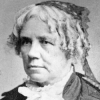Maria Mitchell

Maria Mitchell
Maria Mitchell was an American astronomer who, in 1847, by using a telescope, discovered a comet which as a result became known as "Miss Mitchell's Comet". She won a gold medal prize for her discovery which was presented to her by King Frederick VI of Denmark. On the medal was inscribed "Non Frustra Signorum Obitus Speculamur et Ortus" in Latin. Mitchell was the first American woman to work as a professional astronomer...
NationalityAmerican
ProfessionScientist
Date of Birth1 August 1818
CountryUnited States of America